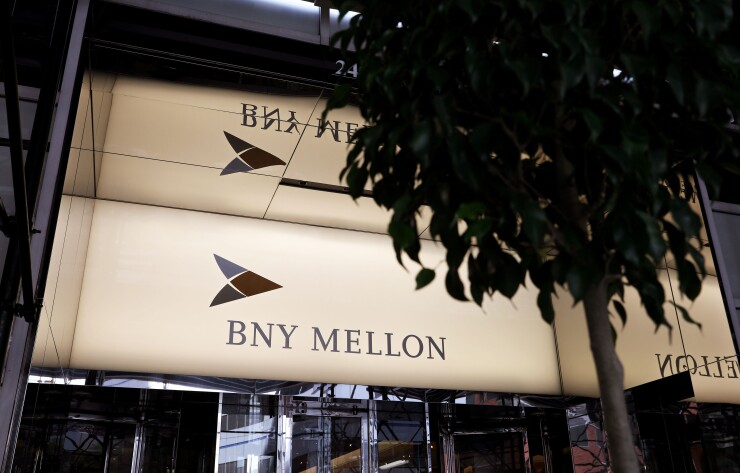
Banks' corporate clients are looking for options that cut card fees, such as account-to-account transactions, but there are
To address this problem, BNY Mellon has launched Bankify, a product that uses open banking to enable companies or organizations to send and receive payments directly from bank accounts, often called pay by bank or account-to-account transactions.
A2A is an old payment method that's gaining new attention as a way to avoid card interchange; open banking, by comparison, is a somewhat newer concept for sharing data. Bankify is designed to cover merchant payments, bill payments, digital wallet funding and other consumer-to-business payment flows. The product is a collaboration with BNY supplying payment processing and Swedish technology firm Trustly providing the underlying open banking technology. Open banking refers to permission-based financial data sharing between banks and third parties, allowing consumers or businesses to use a single account to access multiple financial and non-financial services. By using open banking technology, BNY Mellon is attempting to broaden the types of transactions that can easily access "pay by bank" or account-to-account payments.
"'Pay by bank' hasn't been readily available as an option besides cash in quite some time," said Carl Slabicki, co-head of global payments for BNY Mellon's Treasury Services division.
Most A2A payments are used for utilities or basic subscriptions. The need to authorize transactions and provide guarantees for A2A payments has held up adoption for more complicated transactions such as e-commerce or in-store payments, which for years have been dominated by card payments.
By using open banking, the different parties involved in a payment can directly access other bank accounts more easily, since one account is the common point of access for other services rather than having to access each party in a payment individually.
"You don't need to know stuff like routing numbers or other banking information that makes it clunky," Slabicki said. "Open banking puts this into layman's terms. And if the users agree to data access, the connections between the parties can be seamless."
BNY Mellon is envisioning this system will appeal to users such as billers, which can streamline how consumers share banking data between payer and payee; merchants, which can update their payment systems to connect their bank accounts to consumer accounts both online and in stores; and brokerage firms that want guaranteed settlement to enable instant use of funds during enrollment.
BNY Mellon's fees vary for Bankify based on how it's used, but are generally less than most card interchange costs.
"Cards are very expensive. It's one of the largest fee buckets," Slabicki said. "It's very costly to support credit card payments."
There is also a reduction in charge-off risk, according to Slabicki, since there is more data available on the consumer at the point of purchase through open banking's data sharing.
"With traditional payments, there's a risk of someone buying shoes or another item and walking out of the store, then asking for a return by claiming the shoes were an unauthorized purchase," Slabicki said. "Open banking collects the data that provides a real-time guarantee on that merchant at the point of sale."
There are challenges in deploying A2A payments. Paying with a credit or debit card is a well-established behavior among U.S. consumers. For A2A payments to gain traction, end users need to be able to see the new method's value over what they're used to, according to Matt Gaughan, a payments analyst for Javelin Strategy & Research.
"Certain open banking providers are helping create smooth and engaging user experiences that advance that goal, but obstacles to wider adoption remain," Gaughan said. "The disparate implementation of APIs across nearly 10,000 financial institutions currently limits the reach of such alternatives. But partnerships like [BNY and Trustly] are a step in the right direction."
Anticipating demand for interchange alternatives, payment technology firms, banks and the card networks themselves are working on ways to use open banking to connect customers to more services with an improved user experience and less fees.
And
Open banking creates the potential for new payment flows that can break out of the standard card payment rails, and at least in theory bring on a much better customer experience than what exists today, according to Gilles Ubaghs, strategic advisor for commercial banking and payments for Datos Insights.
The tricky part is creating an offering that improves on the card experience, which is easier said than done, Ubaghs said.
"Cards may be problematic for merchants due to interchange, but consumers don't see any of that, so the question is how to improve on the experience," Ubaghs said. "Open banking creates the parts needed to make it work. But now someone needs to put the pieces together in a way that works that'll give a reason or driver for adoption."






